Get Out of The TV! Persona 4’s Anti-Videogame Message
By thatpinguino 25 Comments
SPOILER WARNING!!! I am going to discuss Persona 4 in depth and I will spoil some of the events that occur at the midpoint of the game. If you haven't played the game or watched the endurance run I advise you do so, but perhaps don't read this post until you finish.
If you have been on Giantbomb for any length of time you have almost certainly been exposed to Shin Megami Tensei: Persona 4. This game rocked the site in the original endurance run and it has been one of the most talked about games on the site since, and that is a true feat for, what was at the time, a relatively small JRPG. However, what I feel gets lost in all of the fanfare about the game’s great story and personality is that the game takes a fairly strong anti-videogame and anti-TV stance. The game’s story and mechanics actually rail against the types of escapist fantasies that it provides. Through the use of things like the TV world, social links, and even the basic character development system, Persona 4 clearly articulates an argument against the very media consumption which its audience is participating in while playing the game. It rejects the consumption of fiction and instead endorses social interaction as the guiding principal by which to live.
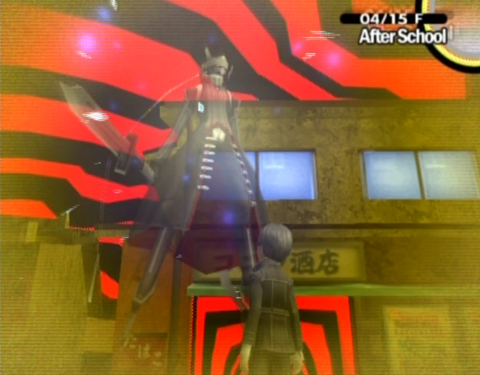
The gameplay of Persona 4 exists as a very interesting hybrid of dating simulation and strict turn-based rpg. Interestingly, the two gameplay elements exist in almost entirely separate realms within the game world. The dating simulation portion of the game exists outside of the Midnight Channel and the TV world, while the rpg portions exist entirely within the TV. In creating this dichotomy, the game establishes both a firm esthetic difference between the fantasy world of the TV and the real world of Inaba as well as a gameplay distinction between the two worlds. Through the game’s creature designs (such as the Hulk Hogan monster and the Voltron mechs), level designs (each level in the tv world is a manifestation of the hidden desires of both society at large as well as the individuals trapped in the TV), and direct exposition (the final boss explains that the TV world is a manifestation of what people want) it is clear that the TV world is intended to be a representation of the collective id and fantasy of society. The TV world is a place where society’s dreams and desires literally run amok. In contrast, the town of Inaba is a relatively realistic depiction of a small, rural, Japanese town where nothing particularly interesting happens. Inaba is the game’s version of the “real world,” where the realities of things like school, social commitments, and jobs must be honored and addressed. In setting up these two parallel worlds I believe that the developers of Persona 4 create a clear distinction between the “real world” and the “fantasy world” in which most modern human spend their time. Modern life is increasingly becoming a balancing act between the realities of work and social responsibilities and the fantastical indulgences which we enjoy, like going to the movies, watching tv, and going on the internet. Persona 4 shows us these two worlds and how they intermingle, and through its mechanics it asks us to choose the “real world” over the fantastical.
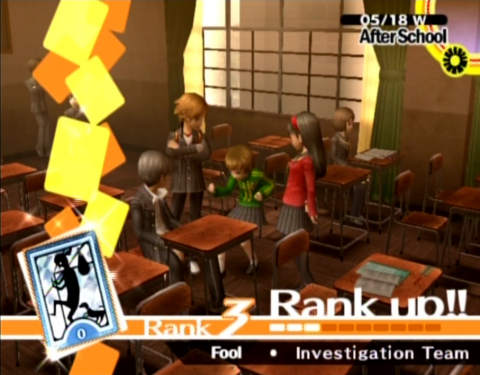
To support the Inaba-as-real-world and TV-as-fantasy-world dichotomy, the developers employed two almost completely separate gameplay systems in each world. The “real world” largely plays like a dating simulation: days are spent socializing with friends, family, and strangers to develop deeper relationships through conversation and general hanging-out. These bonds of friendship are represented by social links, which are a sort of friendship level that provides a one time experience boosts when fusing new personae as well as access to some of the most powerful personae in the game. In general, the higher one’s social link the greater the experience boost that new personae receive during persona fusion, one of the game’s two sources of new personae. Often a maxed social link can result in a newly fused persona learning every ability it can possibly learn all at once upon fusing; thus, “completing” the persona and readying it for a subsequent fusion. The alternative way to level up personae is to enter the TV world and grind in the traditional jrpg fashion: find monster, kill monster, get money, get exp, rinse repeat. Thus, the game allows a player who is diligent in maxing his/her social links to effectively skip large swaths of time in the TV, since the exp provided by a maxed social link is often equivalent to hours of battle. This means that in a pure real-time sense it is more efficient to focus on increasing your social links rather than grinding, as social links take relatively little time to participate in when compared to the battles. Persona 4 uses the min-maxing gameplay habits of its player-base (I would venture to guess that rpg players are some of the most frequent min-maxers in the world) to deliver its message: spend less time in the tv and more time in the “real world” and if you have to go in the tv be efficient about it.
On top of the exp benefits that all social links impart on the main character, some social links directly improve your ability to fight in the TV World. Social links with party members unlock various abilities for your party in the TV world such as their ultimate personae and some useful utility skills. Thus, to maximize all of your party members you must max out at least all of their social links. In providing this gameplay incentive, Persona 4 provides a valid gameplay reason to see some of the key character building moments that define the game’s main cast. Another key social link is the fox social link; the fox social link decreases the cost of the fox’s medicinal services in the tv world and the higher the fox link gets the greater the discounts. As a result, a high social link with the fox can lead to a player clearing an entire dungeon in one day of game time, since the fox’s healing is so cheap that there is literally no reason to leave until a dungeon is cleared. The fox’s social link is key if you want to absolutely maximize every day of game time in the all too short calendar of Persona 4.
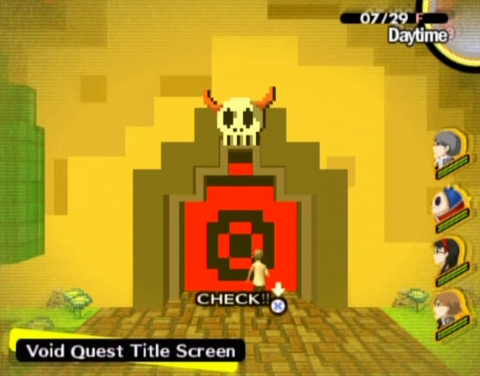
To go along with the simple real-time min-maxing and character min-maxing, there is also the matter of maximizing the amount of activities you can perform in the game’s finite calendar. Almost every action that you perform in game consumes part or all of a day, and time is not infinite. Choosing to enter the TV on any day prevents socializing or any other character building activity, resulting in a daily decision on the part of the part of the player: am I going to spend today getting to know some people, or am I going to spend my time in the tv? On a new game it is especially important to use your time efficiently because you often find new social links that require high personality trait levels (courage, diligence, understanding, expression, and knowledge). Entering the tv prevents the player from increasing those character traits as well (except for a small courage boost that comes from defeating some optional bosses), which in effect limits the number of social links you can participate in. It is simply more efficient in a time-to-levels sense to spend as few days in the tv as possible, and instead max as many of your social links/ character traits as possible during the day. To further incentivize the player to only visit the tv once or twice per kidnapped person, the final few days leading up to a kidnapped character’s death are always rainy, which prevents most social link progress as few people are willing to hang out when it is raining. On top of taking away social links during the rain, the game also provides special item drops during rainy days, as well as discounts on items that are necessary for long tv runs. Therefore, Persona 4 uses strong min-maxing incentives to drive the player to only enter the tv world when there is almost literally nothing else to do. The message here is clear: indulge in tv and the various fantasies therein to your hearts content when there is nothing else to do, like on a rainy day. However, when the sun is out and there are people to meet and things to do then take full advantage of those opportunities. The social links should come first and the tv time should come when you have no other productive option.
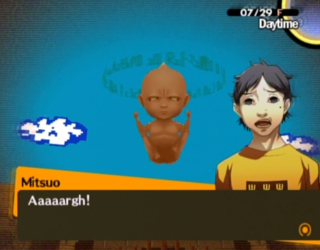
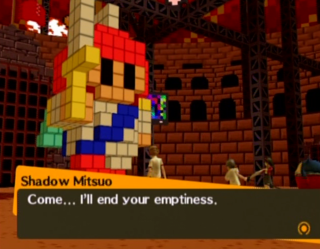
Persona 4 makes its strongest argument against videogames specifically in the level Void Quest. This level is created by Mitsuo Kubo, an antisocial and depressed apparent videogame addict who murdered Mr.Morooka, the main character’s homeroom teacher, in a desperate plea for attention. Void Quest is visually and aurally styled after early 8-16bit rpgs a la Final Fantasy or Dragon Quest and it uses this aesthetic to comment on the emotional stunting that excessive videogame playing can allow. It is unclear whether Mitsuo was depressed or emotionally immature before he became obsessed with videogames or whether he became that way after he started playing; however, Void Quest makes it clear that Mitsuo had become so emotionally divorced from the world around him that he views the murders that occur during the game as a form of game. After most floors the game displays some of the thoughts that Mitsuo was thinking during the murders and they are phrased using things like stat bonuses and battle prompts, for example: “Thy Excitement increases by 4. They Emptiness increases by 1.” This section of the game is intended to show that Mitsuo viewed the murders as a game, but it also shows how game playing had warped his perception of the world around him to the point that he could view actions like murder as a form of game. Void Quest ends with one final metaphor, as the final boss of the level is also a sort of parable against over indulgence in videogames. Mitsuo’s shadow takes the form of a baby surrounded by an armor made of pixels that form a retro-looking knight. This shadow shows how Mitsuo is emotionally stunted; emotionally he is like baby: immature and self-centered. But, he treats videogames as a sort of cocoon to both protect himself from the real world around him and present a façade of power and confidence to the outside world. Videogames give him a false sense of confidence and importance that are not echoed in any way in the real world; thus, his shadow says things like, “I have nothing. I am nothing.” Mitsuo feels a sense of emptiness and worthlessness to his life; however, his attempts to solve his emptiness using games and murder (which he views to be a game) do not actually resolve his issues, they just cause him to further distance himself from the world around him, which worsens his sense of despair. Void Quest serves as an example of the very worst that game playing and fantasy indulgence can cause: an endless quest that takes you nowhere.
Persona 4 uses story elements and multiple gameplay systems to argue that game playing and other forms of media consumption should be limited in favor of more social interactions. Though there is seemingly a bit of hypocrisy in an 80 hour game arguing that players should drop their controllers, Persona 4 largely communicates its message thorough a language that only the most ardent of rpg aficionados can understand: min-maxing gameplay systems. The game conveys its message in a way that uniquely targets the audience who most needs to hear it; namely, the people who would spend hours min-maxing characters and trying to most efficiently utilize their time paying the game (myself included). If you don’t play Persona 4 multiple times or pay close attention to all of the ins and outs of its multiple gameplay systems, you might not see that the game is desperately telling you that going outside and meeting new people is a superior way to spend your time.
All quotes were found on: Lets Play archive

26 Comments